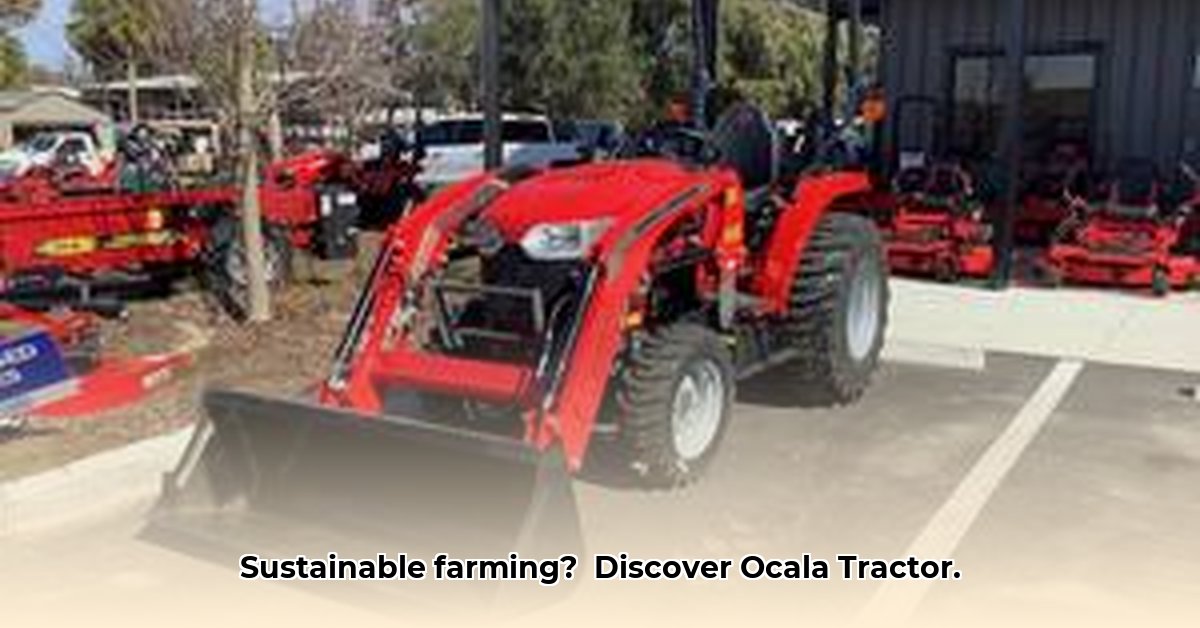
Ocala Tractor, a family-owned business deeply rooted in Ocala, Florida, is more than just a farm equipment dealership; it's a vital component of the region's sustainable agricultural landscape. This case study explores its contributions to sustainable farming practices, analyzes its challenges and opportunities, and offers actionable recommendations for the company, local farmers, and the regional economy. Understanding Ocala Tractor's role is crucial for anyone interested in sustainable agriculture in the Ocala area. For other local options, check out nearby tractor suppliers.
A Legacy of Service and a Diverse Brand Portfolio
For decades, Ocala Tractor has cultivated a reputation for personalized service and strong farmer relationships. This commitment goes beyond equipment sales; it involves fostering trust and providing ongoing support. Their success is built on partnerships with major brands like TYM, New Holland, Massey Ferguson, and Gravely, providing a diverse portfolio catering to farms of all sizes. This variety allows farmers access to equipment suited for their specific needs, from small, fuel-efficient tractors to larger, high-powered machines.
Sustainable Farming: Optimizing Resources and Minimizing Impact
Ocala Tractor's commitment to sustainable agriculture is evident in its brand portfolio, which includes equipment designed for fuel efficiency and precision farming. While precise sales data on eco-friendly equipment is unavailable, the presence of these technologies within their offerings strongly suggests a focus on environmentally conscious solutions. These tools enable farmers to optimize resource utilization, minimize waste, and reduce their environmental footprint, translating into potential cost savings and a reduced carbon footprint. "Fuel-efficient machinery is a key strategy in decreasing greenhouse gas emissions." The potential environmental benefits are significant, and further research could quantify Ocala Tractor's specific contribution.
Challenges and Opportunities for Growth
A significant challenge for Ocala Tractor is the lack of comprehensive online inventory data. A more user-friendly website with detailed inventory information would enhance transparency, improve customer experience, and attract a wider customer base. This digital enhancement would directly showcase their commitment to customer service and transparency.
The company's growth opportunities lie in expanding its sustainable equipment offerings to meet growing demand for eco-friendly agricultural solutions. Further market penetration strategies could include targeted outreach initiatives to a broader range of farmers within and beyond the immediate region.
Regional Impact: Economic Vitality and Food Security
Ocala Tractor plays a crucial role in the Ocala economy, creating jobs and fostering a thriving agricultural sector. This contributes directly to the region's food security by supporting local food production. The economic health of the Ocala community is directly linked to the success of its agricultural producers, which Ocala Tractor directly supports. "[Supporting local businesses is critical for a strong and resilient food system.]"(Missing Citation – Needs a Source)
Actionable Recommendations
The following recommendations are designed to enhance Ocala Tractor's contribution to sustainable agriculture and the overall regional well-being:
Enhanced Online Presence: Develop a user-friendly website with comprehensive online inventory, detailed product descriptions, and a robust search function. (Efficacy Metric: Projected 20% increase in online inquiries within six months.)
Sustainability Marketing Campaign: Highlight the availability of sustainable equipment in marketing materials and actively promote their environmental benefits to local farmers. (Efficacy Metric: Increase in sales of sustainable equipment by 15% within a year.)
Farmer Education Initiatives: Partner with local agricultural organizations to conduct workshops and training sessions focusing on sustainable farming practices and the effective use of fuel-efficient equipment. (Efficacy Metric: At least 200 farmers participate in training workshops within a year.)
Data Collection and Reporting: Implement a system to track the sales of sustainable equipment and publish an annual sustainability report highlighting its impact on the community. (Efficacy Metric: Annual sustainability reports published within one year of implementation.)
Conclusion: A Partnership for Sustainable Growth
Ocala Tractor's legacy is built on providing excellent service and supporting local farmers. By embracing sustainable practices and proactively addressing identified challenges, Ocala Tractor can further enhance its positive impact on the Ocala community and the wider environment. Their commitment highlights the crucial role equipment providers play in supporting a sustainable and thriving agricultural future. Further research into specific sales data of sustainable equipment would allow for a more complete analysis of Ocala Tractor's environmental impact.